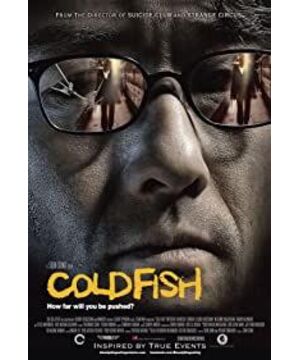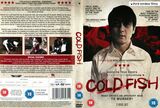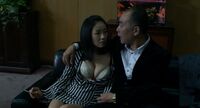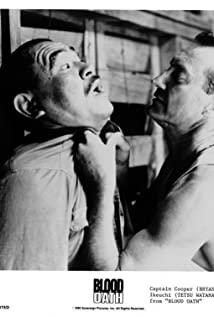As a cult film, it's acceptable, but not great. I doubt Sonoko Wen's ability to shape the characters. In "Mediocre", they are constantly shouting; while "Icy Tropical Fish" is a contrast between indifference and madness. The characters in his shots seem to be on opposite ends of a seesaw—either extreme indifference or extreme madness.
For example, when trying to show a person's confusion, Sonoko Wen may ask to show an indifferent face, but there will be a freeze frame to tell the audience that he is hesitant; or he will be asked to show extreme fear, shrinking , In terms of shaping the intermediate state, Sonoko Wen is either not thinking about it, or he may not be good at it at all.
The whole film tells a simple story - a cracked family of three with a rebellious daughter, a step-wife who doesn't care about housework, and a husband who gets by. Because of an opportunity, I was helped by Murata, who had a successful career. The husband, the head of the household, also fell into Murata's terrifying plan to kill and make money.
The film is very considerate and spends a lot of space to teach you how to destroy the corpse, the viscera, meat and bones all over the floor. The most shocking scene is not the last half-human, half-visceral scene, but the fight in the blood, and the scene where Murata says "I'm sorry, father".
Murata's murders can be traced back to his childhood experiences. Murata, who was abused as a child, knows the importance of strength (in fact, children who have been subjected to DV in their childhood have more DV tendencies when they grow up). That is, if you want to achieve the goal, violence is a very good means. Every time a body is dismembered, the hut is chosen, perhaps Murata's pilgrimage to his father. That is, Murata not only deified his father who had power, but also regarded such a father as an opponent who must be defeated in the end. Fighting violence with violence is a method he learned from his father, and it is also his ultimate goal of tit-for-tat.
It is very important to understand Murata's murder. Money is of course a purpose, because money is also a sign of power. According to the hint of Murata's wife, it was known from the beginning that Murata was a very aggressive man. In fact, violence is not only a means, but also an end. Through violent acts, assimilation with violence, becomes violence itself, and its final direction is to become a father.
Thus, the head of the household became the object of his sacrifice. Why the head of the household? I guess that the head of the household is a reflection of Murata's childhood. The whole process of corpse disposal may be another reenactment (or flashback) of childhood abuse. The cowardly head of the household and the violent Murata, the confrontation between the two forces is a replica of the father and the abused child. Therefore, Murata, who believes in strength, takes everything from the head of the household, and becomes a father, will long for the head of the household to take his class and defeat him. This is actually a wish sown from childhood - the abused child's resistance to his father, replacement The adult householder's resistance to Murata.
The head of the household finally killed Murata, in fact, it was Murata who was in the middle, because this was the revenge of Murata's childhood. However, at the moment of successful revenge, the head of the household changed from a cowardly child to a violent father, and Murata returned to a cowardly child. Gu Murata had been muttering "I'm sorry, Dad" until he died, when he became himself rather than his father.
In other words, this is actually just a copy of Murata's story. Later, the domestic abuse of the head of the household and the murder of his wife were all copies of Murata's father.
This film is interpreted from another angle, and it may be possible to draw the following conclusion: In this world, those who win are always those with power, who give pain to the weak; however, they themselves are not happy, they are very painful. This is a pessimistic view.
Let me talk about two shortcomings: the rhythm of the film is problematic, and the characters are not full enough (either wandering between poles or real).
View more about Cold Fish reviews











